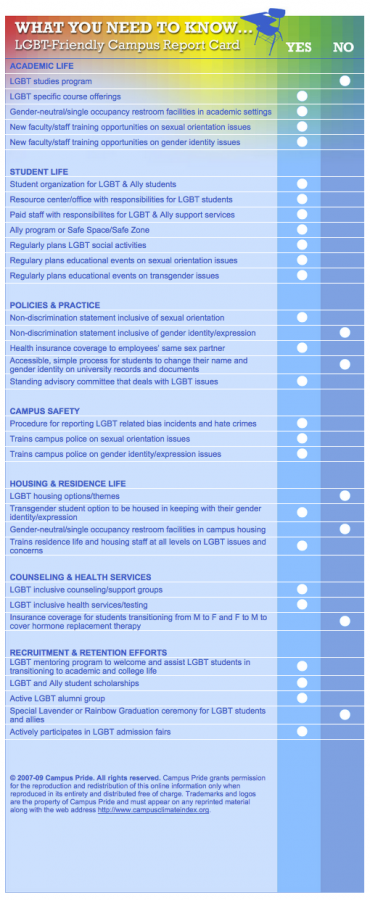College takes part in first online LGBTQ college fair
Courtesy of Campus Climate Index
College takes part in first online LGBTQ college fair
April 6, 2015
Living up to its reputation as a gay-friendly college, Columbia, along with 50 other U.S. colleges, participated in the first-ever online college fair geared specifically toward LGBTQ students.
The March 19 event registered more than 500 participants and connected them with college representatives in a chat room-like forum.
Rebby Kern, media communications and programs manager at the Charlotte, North Carolina-based organization Campus Pride, said her organization has hosted LGBTQ college fairs in the past, but this is the first time they tried a digital version.
“We wanted to give folks in a more rural area more access to find LGBT-friendly colleges,” Kern said. “To find the schools, we reached out to all of the schools that have participated for all of the years in our physical fair, and the online fair was a way to reach those rural students and give colleges another opportunity to come out as LGBT-friendly, give access and reach out to students one-on-one.”
Campus Pride’s goal was to have 50 colleges and universities participate in the event in March and she was excited to see so many colleges willing to take the step to show their inclusivity, Kern said.
It is important for colleges to make an institutional commitment to actively seek out LGBTQ students, Kern said.
“In order for a college to come out as LGBT-friendly, they have to make an institutional commitment to students, and that’s more than just having an LGBTQ student organization,” Kern said. “Having programs in place such as focusing on recruitment and retention and attending the college fair for a school is the best way to say, ‘Yes, we are recruiting LGBT students, and we’re doing it because we care about them.’”
Patrick Fahy, director of Admissions, said the college has participated in multiple Campus Pride fairs for several years. The college’s Office of Admissions makes conscious efforts to seek out LGBTQ students as part of its diversity outreach, Fahy said.
“We are the most diverse art school in the country, and that includes diversity in every form or fashion, and that’s what we talk about,” Fahy said. “Most people, when they regard or reference diversity, they are talking about African-American or Hispanic students thinking that makes them a diverse population, but we consider all diverse populations: socio-economic, political points of view, sexual orientation, religious affiliation.”
Jessica Paul, a sophomore journalism major and a member of Common Ground, the college’s LGBTQ student organization, said she hopes the online fair attracts more students to the college.
It is crucial for the college to find students through these kinds of college fairs and inform them about the support they can receive from the campus community, Paul said.
“We advertise the arts, the majors and the city, but to know there are resources for LGBT students is very crucial when deciding on a school,” Paul said. “For some people, it’s maker or breaker because they want to know they’ll be supported when they come here.”
Although Paul found support through Common Ground, she said she hopes the Office of Admissions will take the time to inform prospective students about the college’s LGBTQ resources more often during the application process in the future.
“I did feel supported, but there could have been a lot more advertisement and backup from the school,” Paul said. “To hear that they participated in the fair is very inspiring. It’s a step in the right direction.”
Fahy said it is the college’s goal to speak about the school’s different aspects of diversity when recruiting students.
“We include [diversity] in our pitch at Columbia to talk about why you would like to come to Columbia,” Fahy said. “We tell you about the inclusivity and how it inextricably links to our mission. Inclusivity is who we are and any constituent would love to hear that. When we talk to students, we talk about that as part of the Columbia experience.”
The idea of creating an Office of Diversity, Equity and Inclusion was introduced for the Fall 2015 Semester in the first draft of the Strategic Plan created by the college’s administration. Fahy said he could see the Office of Admissions working with this new office in the future, and Paul said she would also completely support the creation of this new office.
Kern said Campus Pride hopes to have an online college fair next year because of the success of the first one. She said she wants the organization to continue helping students in their search for LGBTQ-friendly schools.
When institutions show they are supportive of their LGBTQ students, they are more likely to succeed academically, Kern said.
“If [LGBTQ students] can bring their full self to campus, they’ll feel better about themselves and thrive in school,” Kern said. “It’s not the responsibility of the student to teach the school how to be LGBT-friendly. Their job is to go there and learn and do the best that they are able. Those campuses help facilitate that and help students flourish.”








